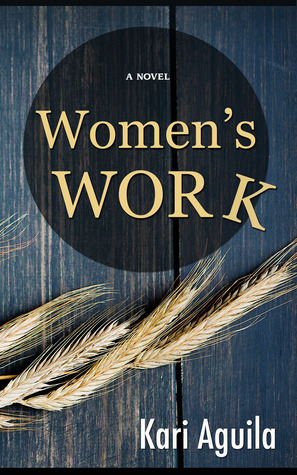
Women’s Work, November 2013
What’s the book’s first line?
“She moves quietly, mindful of her footfalls, to avoid the broken sections of blacktop.”
What’s the book about? Give us the “pitch”.
What would change if women ruled the world? And once they have the power, what will they do to keep it?
It wasn’t hard to justify what the women had done since the end of the Last War. They rebuilt their bombed-out neighborhoods as best they could and tried to establish peace and gender equality. But small groups of men roam the country, viciously indicating that the pendulum may have swung too far. Kate is a widowed mother of three struggling for survival in a broken and rural landscape, and struggling with the new rules and the fear and anger that lingers. When a strange man shows up on her porch one night, will she risk everything to save him? Does he deserve her help?
Women’s Work is a compelling and dystopic look at gender roles and the damage caused by placing one group in power over another. This trailblazing novel is being heralded by critics as a timely and necessary look at the oversimplification of the issues of stereotypes and equality!
What inspired you to write the book? A particular person? An event?
The media has given us a lot of information about the “War on Women” in the last couple of years, and I am often disturbed at the polarizing ways in which the issues are portrayed. Too often we hear only one side of the complex issues that surround women’s rights and gender equality. I wanted to write a story that could pose the question, “What would change if women ruled the world?”
It’s a question that I hear tossed around lightly, with very different answers depending on the gender of the crowd. Here’s an example: One night I was watching a late-night interview show, and the male host asked a female member of the U.S. Congress why things move so slowly in government. Her answer was, “If more women were in Congress, we would get much more done.” The Congresswoman went on to say that women are better at conversation and compromise, are less likely to rush to violence, and would be able to fix things. Half the audience cheered loudly, and the male host of the show was visibly offended.
Could such a simplistic view of gender and character be true?
On the other side of the story, when I ask men what would change if women ruled the world, they often chuckle and say, “I thought they already did.” I won’t give you all the statistics and world headlines that strongly debate this notion, but let’s just say that most women around the globe would disagree.
Women’s Work is a dystopic look at gender roles, where women have had to rewrite the rules of society to survive in a post-apocalyptic world. After women have been oppressed for years by male politicians determined to roll back women’s rights in an effort to simplify and purify their way of life, a brutal global war breaks out. After four years of war, the women decide the only way to stop the death and destruction is to rise up and take control. In the aftermath of the war, women attempt to establish gender equality, but soon realize that once one group obtains power over another, it is a slippery slope to oppressing the weaker group. The idea that women would somehow be more compassionate, gentle and fair, and be better leaders is examined and exposed.
What’s the most distinctive thing about the main character? Who-real or fictional-would you say the character reminds you of?
Kate is a widowed mother of three struggling to survive in a world that has fallen off ‘the grid’. Raised with the conveniences of the modern world, she is suddenly forced to relearn the nearly forgotten methods of growing, hunting for, harvesting and preserving her own food. She and her young children have faced hunger and darkness in the aftermath of a devastating war, and now that they have finally started to feel like they might just survive from year to year, they are forced to deal with the new threat of raiders. Surrounded by fear, rumors and uncertainty, Kate is cautiously trying to determine what society’s new rules mean for her family while taking her own journey from anger to understanding. Kate is forced to undergo a most difficult change — the evolution of her deeply held beliefs. She represents everyone who has been hurt before, and now has to decide if she will open up her heart again.
What’s the main reason someone should really read this book?
My goal for this novel was to spark conversations about the meaning of equality, while revealing the overly simplified way that some people exploit the issues. Hopefully, you will identify with Kate’s struggle to justify the women’s actions to her own young son and daughters, and as the thrilling suspense of the story builds to a head, you will be moved by the fear and frustrations she feels. Women’s Work is an excellent selection for book clubs and individuals, and readers will be talking about the characters and themes of this story for a long time.